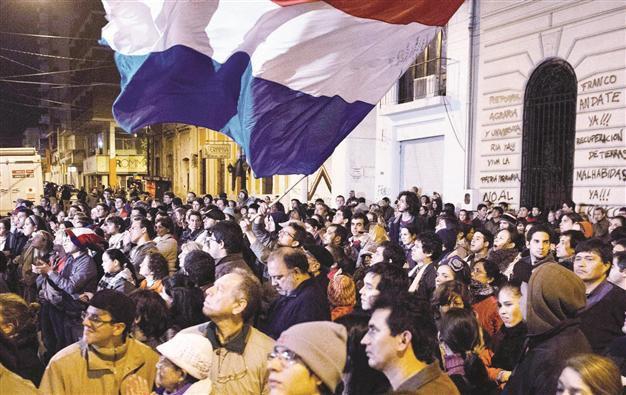‘Parliamentary coup’ hits Paraguay as Lugo ousted
ASUNCION, Paraguay

People demonstrate in front of the TV Publica channel headquarters in support of ousted Paraguay President Fernando Lugo. AP photo
Paraguay’s ousted leader Fernando Lugo yesterday accused lawmakers of carrying out a “parliamentary coup d’etat” to force him from power, as international protests mounted over his abrupt removal.In a 39-to-4 vote on June 22, senators found Lugo, a 61-year-old former Catholic priest, guilty of performing his duties badly during a land dispute last week that claimed the lives of six police and 11 squatters on a privately-held farm. His Vice President Federico Franco was quickly sworn in to cheers in the Congress as Paraguay’s new leader.
In his first public appearance since his impeachment, Lugo again blasted Congress for its snap decision but said he would nevertheless accept it in the name of peace. “Lugo has not been dismissed; democracy has been dismissed. They have not respected the popular will,” the ousted leader said in an unexpected appearance at a street protest attended by about 500 people in the capital Asuncion. He called his impeachment “unjust” and called for “peaceful” demonstrations in the impoverished, landlocked South American nation.
“There was a parliamentary coup d’etat... the arguments for impeachment had no value,” Lugo said after entering the studio of TV Publica, site of the protest, for a brief news conference.
Franco told Agence France-Presse in an interview at his office that he hoped Lugo would help him stem the international outcry over the change in power. “Right now I’m trying to speak with President Lugo. I’m going to do it. I think his presence as a Paraguayan is very important to give an international image, because right now we need a legally constituted government,” he said.
‘Rupture of democratic order’
Argentina ordered the immediate withdrawal of its ambassador from Paraguay due to “rupture of the democratic order,” according to Reuters. The move came a day after Argentine President Cristina Fernandez described Lugo’s ouster as a coup. She also warned that measures could be adopted against Paraguay within the Mercosur trade bloc, which groups Argentina, Brazil, Paraguay and Uruguay.
Brazil called its ambassador in Paraguay home for consultations. It “condemned” Lugo’s removal because he was not able to defend himself properly, “compromising a fundamental pillar of democracy.” Uruguay, another member of Mercosur, urged Paraguay to call elections as soon as possible.
Peru and Mexico also questioned the speed of the process to remove Lugo from office, although Mexico recognized the legality of the impeachment process. Chile said Lugo’s removal “did not comply with the minimum standards of due process,” and Colombian President Juan Manuel Santos said: “Legal procedures shouldn’t be used to abuse. ... What we want is to help stability and democracy be maintained in Paraguay.”
The torrent of furious responses to the ouster came not just from traditional leftist allies like Bolivia, Nicaragua and Venezuela. Franco said he would work to convince Argentina to reinstate its ambassador and would explain to other governments in the region that the impeachment was legal. “[Lugo] recognized he faced a tribunal, he recognized the tribunal’s verdict and finally he agreed to step down.
Even more importantly, he asked for people to remain peaceful so no more blood would be shed,” Franco said. “At no time was there a rupture or a coup, there was simply a change of leadership in line with the Constitution and the country’s laws.” Paraguay is one of the poorest countries in South America and Lugo, now 61, vowed to improve the quality of life of low-income families when his election ended six decades of rule by the Colorado party. But he struggled to push reforms, including land redistribution to poor peasant farmers, through Congress.
















